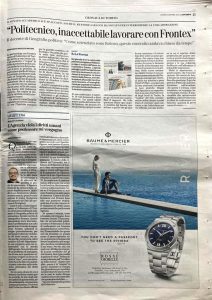Note: this open letter was also published in Italian in the newspaper La Stampa (see below for the scan of the article)
The EU anti-fraud unit (Olaf) report on Frontex is clear. The Agency ignores the human rights of people in transit across the Mediterranean and the Balkans. There is proof of how Frontex’s planes and drones have witnessed migrants drowning in the high sea between Lybia and Italy, and they did not intervene. This is not only a violation of Article 18 of the EU Charter of Fundamental Rights (right to asylum) but also, more simply and fundamentally, of Article 2 (right to life) and numerous international maritime conventions requiring anyone witnessing situations of distress in the high sea to intervene or alert bodies capable of intervention. Frontex systematically avoided any kind of intervention on purpose, on a number of occasions, violating the fundamental right to life of the people in situations of peril on those boats. The Agency itself recognised this, at least implicitly, when its Director resigned seven months ago at the surfacing of the first revelations from the (at the time undisclosed) Olaf report.
As it is known, my Department at the Polytechnic of Turin, where I am full Professor of Political and Economic Geography, provides cartography services to Frontex. This association between the two institutions is problematic not only because there is no way to know how Frontex will use the maps (potentially, to pursue the further violation of human rights), but also because, by proxy, everyone in my Department, me included, is now relatable with the doings of the Agency. This is not just a problem of image, but a serious ethical question: can I carry ‘ethical’ research work, if my Institution is doing affairs with a third party who is involved in the systematic violation of human rights?
For a year, some of us have been forcefully fighting this agreement (back story, in ENG and ITA). In one of the latest chapters of this story, just a few weeks ago, in an unprecedented move, the University of Turin officially asked the Polytechnic to take an active stance against this agreement with the Agency (in ENG, and ITA). Yet, not the overwhelming evidence of the Olaf report, nor the stances of researchers and students in Turin, are enough for my employer to reconsider their untenable position. Following the request from the University yesterday, the Senate of the Polytechnic of Turin was asked once again to vote on the opportunity to maintain the collaboration between my Department and Frontex and, by 19 votes against 29, the Senate voted to maintain the agreement (as reported by Luca Rondi in Altreconomia). As if nothing matters. As if the Mediterranean and its bodies are on another plane of existence. As if collaborating with Frontex was just a technical matter: something detached from the doings of the Agency.
If this is science, as a scientist, I am ashamed. I am angry, furious. It is unacceptable that a public University such as the Polytechnic refuses to confront the overarching amount of evidence against Frontex. It is unacceptable that this has not become a major point of ethical concern: a point where the praxis of doing academic labour can acquire, or lose its sense entirely. To me, yesterday, with that vote, the Polytechnic lost the little credibility they had left. There is no possible talking of ‘ethics’, now. No possible bombastic speech on ‘research excellence’. We are complicit: this is what ‘science’ is at this time in Europe. For the students, and for the very few researchers who are still seeing things otherwise, I will work so that this is not the end.


